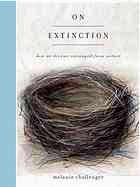
On Extinction
How We Became Estranged from Nature
کتاب های مرتبط
- اطلاعات
- نقد و بررسی
- دیدگاه کاربران
نقد و بررسی

Starred review from October 1, 2012
Award-winning poet Challenger (Galatea) imbues this ambitious meditation with the courage of an explorer, the scientific curiosity of a botanist and a geologist, the excited digging of an archeologist, the compassion of a cultural anthropologist, the long reach of a historian, and the urgent concern of an environmentalist. She travels from a writer’s solitary cabin on the Ding Dong Moor, close by the ruins of a tin mine in Cornwall, England, to a journey to Antarctica with the British Antarctic Survey, back to the North Yorkshire town of Whitby, and on to the tundra of the Arctic where the language and culture of the Inuit barely survive. Eventually Challenger comes to rest in a narrowboat on the River Cam in Cambridgeshire. At every stop in her “peregrination,” she muses on evolutionary changes marked by extinctions past and present. The chief culprit of our “estrangement from nature” in the 20th century is, for her, “the urge to fuse humans and technology.” Throughout this beautifully written, moving, and important book, Challenger yearns to find that feeling of belonging to a particular place. Her connection, one comes to feel, is to the past and present of our whole precarious planet. Agent: Jessica Woollard, the Marsh Agency.

February 1, 2013
Poet Challenger (Galatea) begins this book by recalling a childhood visit to a natural history museum and her burgeoning desire to understand why extinction matters. She ends with her return to Cambridge University by way of Antarctica, and in between engages in an extended discussion of humanity's estrangement from nature in concert with a dizzying number of references to ideas, names, and places. Challenger reflects on her past, her travels, and the extinction of languages, cultures, and species, returning to a nostalgia born of industrial change, creative destruction, and distance from the natural world. VERDICT Sometimes thought provoking, sometimes enjoyable, the book is also tiring in its frenetic movement from place to place and topic to topic. Nevertheless, there is much to appreciate here. Challenger writes well and delivers some beautifully descriptive passages. Recommended for those interested in an exploration of humanity's growing distance from nature and its connection to modern society and technological innovation.--Jon Bodnar, Emory Univ. Lib., Atlanta
Copyright 2013 Library Journal, LLC Used with permission.

October 15, 2012
A deep look at the human capacity for extinction twined with roamings to the far ends of the earth, from poet and fledgling natural historian Challenger (Galatea, 2006, etc.). Spurred by her lack of belonging to a particular place and her sense of alarm over her ignorance of the natural world, the author struck out to investigate how such a mindset could lead to extinction of both creatures and cultures. She has a rangy curiosity that extends well past ignorance and alienation as the sole agents of the man-made extinction. As she travels from abandoned whaling stations on South Georgia Island to the wildness of Bird Island to the fraught lifestyle changes afoot in Nunavut, she examines such ideas as nostalgia being a trigger for extinction; the effects of a Hobbesian industry of survival; a grief-stricken burying of the past in a headlong rush that devastates nature; the notion, from early Christianity to Locke, of dominion; the rise of industrialization and globalization, in the process squashing the intimate and particular relationship with a place, that feeling of safety and confederacy with the land. She faces the elemental question of exactly what is natural, when all is in flux to the turbulent, indefatigable forces of change. What rises so pungently from her travels and ruminations are the vanishing cultures, the ways of life that capture the idiosyncrasy of place, how "[t]his move from distinctive cultural knowledge born of the varied attributes of landscapes to the universal cultural knowledge of technologies available worldwide is akin to the disappearance of diversity in nature." A formidable inquiry into why the marvels of nature and the distinctiveness of cultures are constantly imperiled.
COPYRIGHT(2012) Kirkus Reviews, ALL RIGHTS RESERVED.

December 1, 2012
An extended essay exploring Challenger's thoughts about her and humanity's attitudes toward nature, this work opens with her lament, looking back on growing up near London, over feeling immured, without even a favorite flower to call her own. Reflecting on memories of a grandmother's reaction to the urbanization of the British landscape, Challenger repairs to Cornwall, the first of several journeys that structure her ruminations. Once in placeher subsequent destinations are the British territories of the South Atlantic Ocean and the Canadian Arcticvestiges of Cornwall's millennia of tin mining entwine with Challenger's references to philosophers and naturalists by way of coming to grips with economic activity's tendencies, as she sees them, to debilitate the environment. The remnants of the whaling industry, in particular, fascinate her and also, by extension, industrialism's erosion if not extinction of indigenous cultures. With her literary ruminations and search for an endangered flower continuing through an essay-ending boat trip through Cambridgeshire, Challenger offers no certainties but intimates that reconnection with nature is possible, a hopeful posture that should attract readers.(Reprinted with permission of Booklist, copyright 2012, American Library Association.)

























دیدگاه کاربران